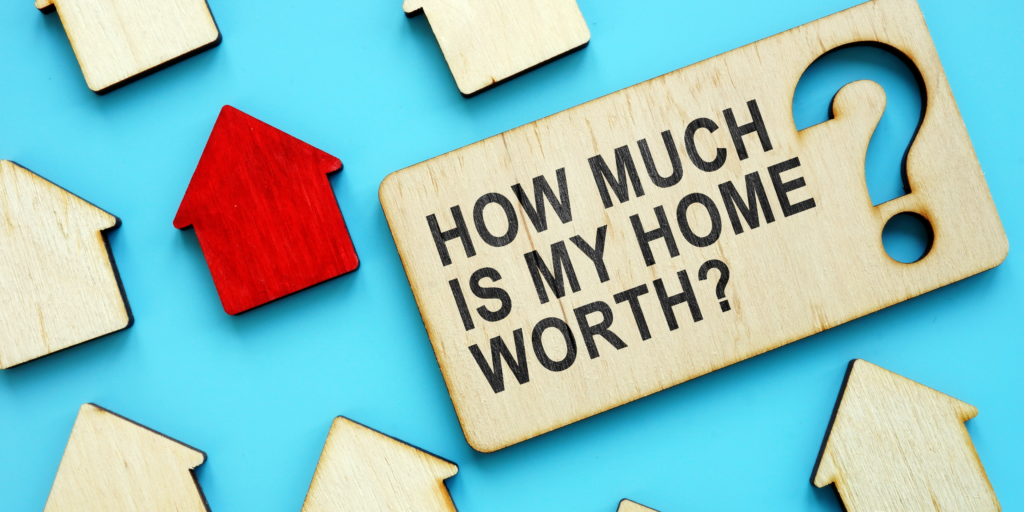How to find your property’s value
In Today’s market finding your home value can vary quite a bit. But looking at different factors, websites, true MLS comps, finishings, and getting an idea of how value is established can help you understand your home’s value.
So, How much can I sell my home for?
One of the challenges in determining your home’s value is that “value” is subjective; one buyer may be willing to pay more than another. So how do you find that sweet spot, meaning a listing price that will attract buyers and help you reach your goals?
The more you know about the factors that decide the value, the easier it is to establish realistic expectations for listing and selling.
Start with online valuation tools
Online home value calculators use the information you provide about your home, along with information gleaned from public records, to calculate an estimated value of the property. They’re a simple and convenient way to get a ballpark idea of what your home might be worth.
Here are some tools you can use:
- Zillow Zesstimates
- Red Fin
- Realtor.com
Pros of online valuation tools:
Most are free and easy to use.
They can quickly give you an estimate of your home’s value.
Many valuation tools update regularly, which is useful if you need to tweak your list price during the selling process.
Cons of online valuation tools:
These tools are designed to provide an estimate and may not take into account unique aspects of your home that appeal or don’t appeal to buyers.
Valuations can vary from one tool to the next, depending on which factors the tool uses to determine value.
These tools generally don’t take into account things like renovations or repairs, which can significantly influence your home’s value.
Work with a realtor
Realtors have their own techniques and tricks, it can be helpful to get a second opinion to go along with the estimates from an online valuation tool. The process many Realtors use to estimate a home’s value is called a Comparative Market Analysis (CMA).
A CMA includes information about comparable homes (also known as “comps”) in your area. According to Nolo, a good CMA can tell you what homes similar to yours are selling for, how long it’s taking them to sell, and what homes sold for compared to their original list price.
Here is how I find Values, click here Not to toot my own horn, but I’ve been doing this for years, taking many classes on how appraisers do it, and comping my own properties for investments. I personally use RPR, it’s an online tool only for realtors. We can make adjustments and it’s been pretty much been right on since I’ve been using it. I’m a good start as well.
Hire a professional appraiser
When someone’s buying a home, the bank requires them to get an appraisal at some point before the underwriting of the loan can be completed. As the seller, you’re not required to get an appraisal but it may be a good idea if you don’t want there to be any second-guessing about your home’s value when you’re ready to list.
It’s the appraiser’s job to provide an impartial, thoroughly researched estimate of a home’s value. They do that by visiting the property and reviewing recently sold or pending sale comps.
They would also look for where the home is located, whether the home is in a FEMA flood zone when the home was built, the type of foundation, whether the home has any amenities, such as a pool, deck, or fireplace, any structural improvements or repairs that have been made or
whether any additional repairs or improvements are needed. An appraiser would also consider the sales history of the home and the approximate replacement cost to rebuild the home.
Getting an appraisal on top of a CMA or BPO can give you a well-rounded picture of your home’s value. If the appraisal aligns closely with the CMA or BPO, that can help you be more confident in choosing a list price, but keep in mind, there are no guarantees you can sell your home based on these measures.
Analyze your own computation
You might not have access to the MLS, but you can still use some of the same factors to compare your house to similar ones selling in your area, including:
Structural components and features, age and size, sales history, any upgrades or improvements, overall condition of the home, neighborhood and location, listing price vs. actual sale price, etc.
You do, however, have to remember to account for differences between your home and comps that could affect value.
The prospect of closing the deal on a sale becomes much less intimidating when you’re heading to market with a carefully researched valuation in your back pocket.
Remember, the goal is to sell your home at the right time and at the right price according to your needs. The more accurate and realistic your price is the more likely your house is to sell faster.
Harry Eaves
310-367-9998
harryeaves@yahoo.com

